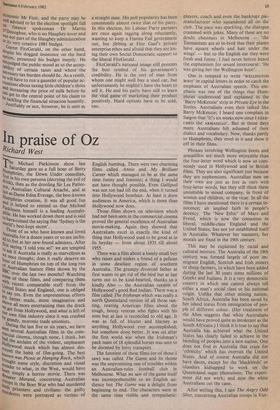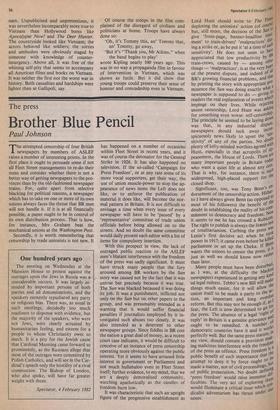In praise of Oz
Rich ard West
The Michael Parkinson show last Saturday gave us a full hour of Barry Humphries, the Down Under comedian, first in his own persona (decrying the evil of drink), then as the drooling Sir Les Patter- si,c3:1, Australian Cultural Attache, and at Est as Dame Edna Everage, the best-known unlaries creation. It was all good fun '„ncl it helped to remind us that Michael earkinson himself is a leading Australo- t13111,!e. He has worked down there and is said have coined the saying that `Sydney is the world's best-kept secret'. Those of us who have known and loved Australia for a dozen years or so are inclin- er(' to fret at her new-found admirers. After tirst &aying 'I told you so!' we are tempted It: ask if Australia is really as marvellous as he once thought; does it really deserve an 2,14 of Humphries on top of the long run i'31 Australian feature films shown by the RC over the last two months? Watching of these films, and comparing them with recent comparable stuff from the it-fulled States and England, one is obliged ao. saY yes. Even the unpretentious efforts above better made, more imaginative and more entertaining than the dreck we get from Hollywood, and what is left of Or own film industry since it was crushed by greedy, moronic trade unionists.
During the last five or six years, we have Zen several Australian films in the corn-
cinema, though none, I think, has had i the acclaim of the violent, unpleasant N 4°111'1'0'00d muck which has almost des- k the habit of film-going. The best brought was Picnic at Hanging Rock, which ,.
`ought some style, discretion and visual blend to what, in the West, would have
Breaker simply a horror movie. There was 'tutegker Morand, concerning Australian br°°Ps in the Boer War who had murdered 2th prisoners and civilians: the guilty '"Orderers were portrayed as victims of English humbug. There were two charming films called Annie and My Brilliant Career which managed to be at the same time funny and feminist; a thing I would not have thought possible. Even Gallipoli was not too bad till the end, when it turned into Hollywood bombast. At least it drew audiences in America, which is more than Hollywood now does.
Those films shown on television which had not been seen in the commercial cinema proved the general excellence of Australian movie-making. Again they showed that Australians excel in exactly the kind of thing that Hollywood used to be good at in its heyday — from about 1935 till about 1955.
There was a film about a lonely small boy who raises and makes a friend of a pelican in some desolate region of southern Australia. The grumpy divorced father at first wants to get rid of the bird but at last turns out to be kind-hearted, thanks to a kindly Abo — the Australian version of Hollywood's good Red Indian. There was a film called The Irishman which was really a north Queensland version of all those ran- ting, roaring American films about the tough, boozy veteran who fights with his sons but at last is reconciled to old age. It was as full of bluster and blarney as anything Hollywood ever accomplished; but somehow done better. It was set after the first world war when the Irishman's pack team of 18 splendid horses was seen to be doomed by lorry transport.
The funniest of these films (or of those I saw) was called The Game and its theme was the unpromising one of troubles within an Australian-rules football club in Melbourne. What we saw of the game itself was incomprehensible to an English au- dience but The Game was a delight from beginning to end. The characters were at the same time risible and sympathetic:
players, coach and even the bankrupt pie- manufacturer who squandered all on the club. The pace was sparkling, the dialogue crammed with jokes. Many of these are no doubt chestnuts in Melbourne — `the Tasmanians are so in-bred that their planes have square wheels and hair under the wings' — but to the English ear they were fresh and funny. I had never before heard the euphemism for sexual intercourse: `He was giving her the Wellington boot'.
One is tempted to write 'WELLINGTON BOOT' in capital letters in order to catch the emphasis of Australian speech. This em- phasis was one of the things that Hum- phries understood and explained in the `Barry McKenzie' strip in Private Eye in the Sixties. Australians even then talked like Barry McKenzie; I heard one complain in Saigon that `It's six weeks now since I EXER- CISED the ARMADILLO'. But in those days many Australians felt ashamed of their dialect and vocabulary. Now, thanks partly to Humphries, they revel in it and show it off in their films.
Phrases involving Wellington boots and armadillos are much more enjoyable than the four-letter word which is now so com- monly used in Hollywood and in British films. They are also significant just because they are euphemisms. Australian men on their own are just as free as ours with four-letter words, but they still think them unsuitable in mixed company, in front of women and children, or the vicar. In all the films I have mentioned there is a certain in- nocence; an implied faith in people's decency. The `New Ethic' of Marx and Freud, which is now the consensus in liberal, middle-class England and the United States, has not yet established itself in Australia. Whatever her manners, her morals are fixed in the 19th century.
This may be explained by racial and cultural mixture. The Australia of the 19th century was formed largely of poor im- migrant English, Scottish and Irish miners or sheep farmers, to which have been added during the last 30 years some millions of Greeks and Italians. It is a very democratic country in which one cannot always tell either a man's social class or his national origin. Unlike that other mining nation, South Africa, Australia has been saved by her island status from immigration of peo- ple of different colour. (Her treatment of the Abos suggests that white Australians would have proved quite as intolerant as the South Africans.) I think it is true to say that Australia has achieved what the United States has clearly failed to achieve in the blending of peoples into a new nation. One does not find in Australia that craze for `ethnicity' which has overrun the United States. And of course Australia did not have slaves, except for the `blackbirds' or islanders kidnapped to work on the Queensland sugar plantations. The experi- ment did not work; and now the white Australians cut the cane.
After writing this, I saw The Angry Odd Shot, concerning Australian troops in Viet- nam. Unpublicised and unpretentious, it was nevertheless incomparably more true to Vietnam than Hollywood bores like Apocalypse Now! and The Deer Hunter. The countryside looked like Vietnam; the actors behaved like soldiers; the sorties and ambushes were obviously staged by someone with knowledge of counter- insurgency. Above all, it was free of the whining self-pity that seems to accompany all American films and books on Vietnam. It was neither the first nor the worst war in history. Both casualties and hardships were lighter than at Gallipoli, say.
Of course the troops in the film com- plained of the disregard of civilians and politicians at home. Troops have always done so: 'Oh, it's Tommy this, an' Tommy that, an' Tommy, go away, But it's "Thank you, Mr Atkins," when the band begins to play° wrote Kipling nearly 100 years ago. This was in no way a propaganda film in favour of intervention in Vietnam, which was shown as futile. But it did show that young troops could preserve their sense of honour and comradeship even in Vietnam.

























 Previous page
Previous page